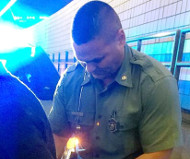3/20/2019
Federal Ticket Quota Drove Massachusetts State Police ScandalMassachusetts state troopers busted for failing to meet the federal ticket quota and writing bogus tickets.

Former Massachusetts state trooper Eric Chin will spend three months behind bars if US District Judge Richard G. Stearns later today agrees with the recommendations of federal prosecutors. Chin is one of forty troopers who were caught cheating taxpayers by claiming overtime that was not worked. He faces sentencing at the Boston federal courthouse.
Not all the officers involved will face justice, as Chin and seven fellow troopers are the only ones indicted for embezzlement so far. The members of Troop E ran speed traps on Interstate 90 between Boston Harbor and the New York border, but they could pad their salary with a time-and-a-half bonus through a federally funded speed trap detail called AIRE, the Accident and Injury Reduction Effort. Current federal law requires local and state law enforcement to meet ticket quotas to qualify for federal funding, as prosecutors confirmed last week. Officers who did not play along would lose out on bonuses that stretched into six figures.
"Troopers were expected to issue a minimum of eight to ten citations for each AIRE shift," assistant US attorney Mark Grady explained in court filings. "Any failure to issue the required number of citations had to be explained to supervisors and command staff. Repeated failures to meet this quota often resulted in a trooper being blocked from receiving such overtime opportunities."
The US Department of Transportation inspector general began looking into the bonus payments and realized many of the troopers did not work the hours they claimed. They would write the eight or ten ticket minimum, then go home before the four-hour shift was over. If the weather was bad, they would not write any tickets as they would be "redeployed" by a supervisor.
"Reminiscent of a grade school 'snow day,' these troopers treated the AIRE overtime program as if it were a paid holiday," Grady wrote.
Chin further padded his ticket numbers by writing bogus traffic citations with altered dates and other falsified information. Chin entered a plea bargain that severely limited the potential for a long jail sentence, even though he was among the highest paid members of Troop E. In 2016, he took home $302,400, including $131,653 in overtime.
"Chin took multiple steps that were carefully orchestrated and effectively designed with the principal purpose of concealing and sustaining this abusive and lucrative scheme," Grady explained. "Few crimes strike at the core of the justice system more than those involving law enforcement officers who choose to break, rather than uphold, the law. Though at its heart a crime motivated by simple greed, it is far more troubling than the run of the mill fraud cases in this court."
Other Troop E members made out well in the program. Sean Hoye walked away with $246,135 including $92,375 in overtime. Matthew Sheehan took $233,351 with $100,401 in overtime. Kevin Sweeney made $218,513 with $97,677 in overtime. Heath McAuliffe pocketed $180,215 in 2015 counting $83,496 in overtime. Daren DeJong was paid $179,971. Lieutenant David Wilson was paid $259,476 counting $103,477 in overtime.


